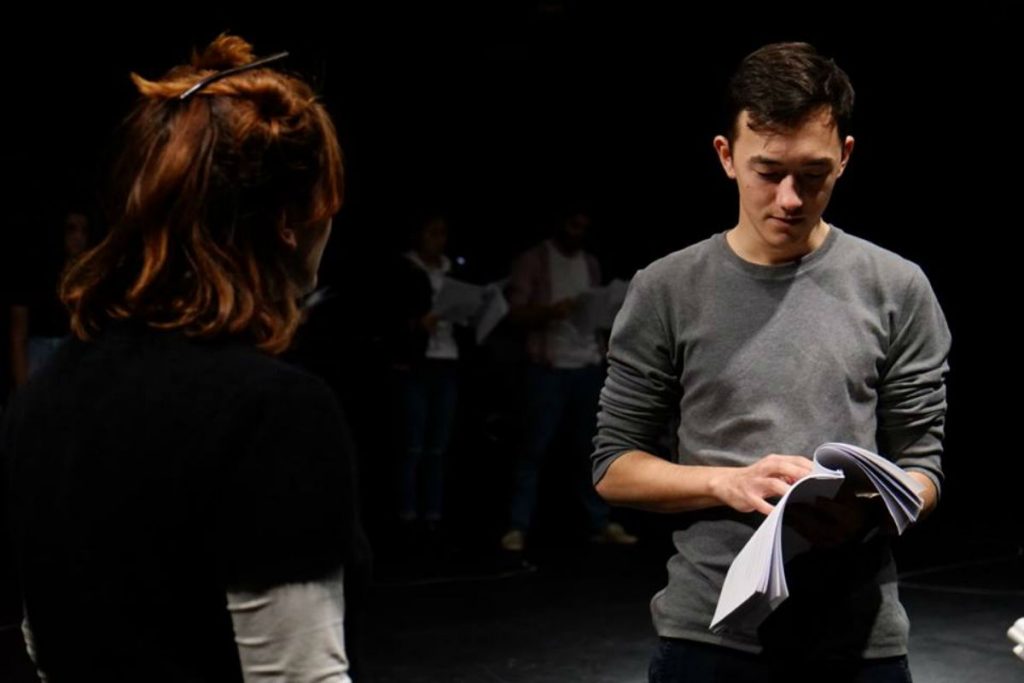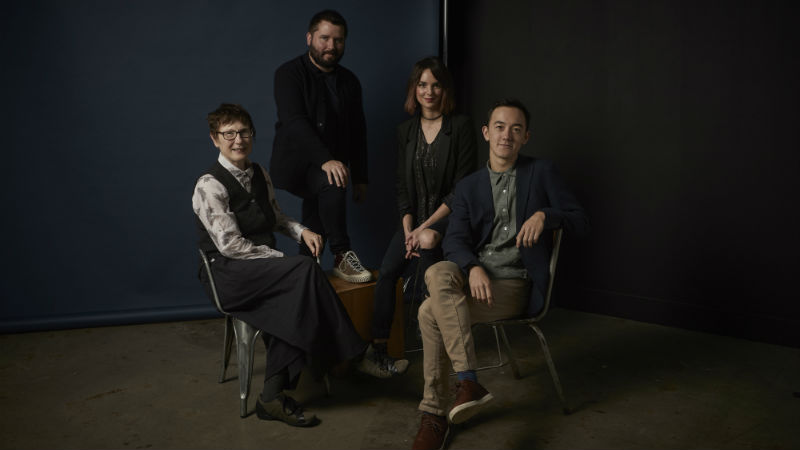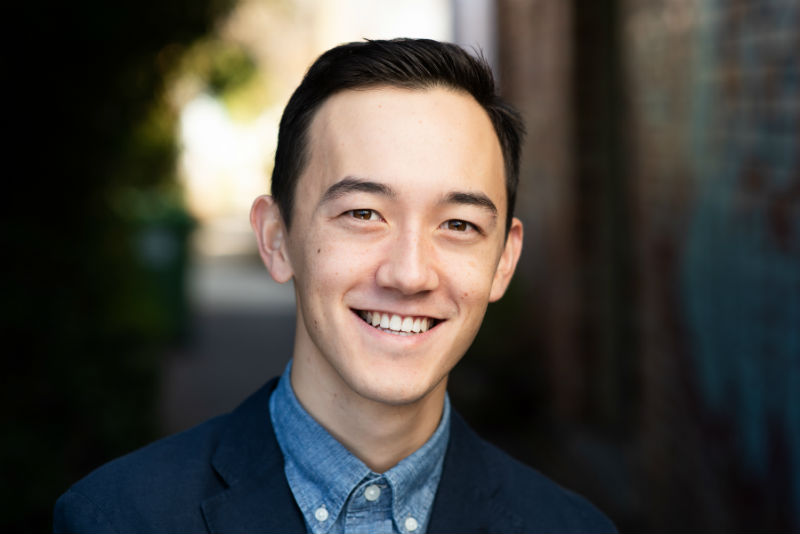Meet Kim Ho, Master of Writing for Performance student

Having majored in English and Theatre studies and having already written two full-length plays, Kim Ho decided to apply for the Master of Writing for Performance to gain more control over his writing craft – and found himself in the surprising company of acrobats, musicians, and mining company employees.
By Susanna Ling
Hi Kim, how did you get into writing and theatre in general?
I really wanted to act when I was younger. I did a lot of community theatre and school productions from about the age of eight in Sydney. I grew up with a lot of movies – like late night, Friday night movies – so pop culture was really deeply infused into my childhood.
When I was in Year 10 or 11, I started coming to the theatre and seeing the potential of realism and also the potential for experimentation.
In Year 12, I took part in the Australian Theatre for Young People‘s (ATYP) monologue writing competition which was specifically for students doing the HSC. The ATYP really liked the three-minute monologue I submitted and said, “We want to help you make it into a longer monologue to be filmed.” The film was called The Language of Love, and it was a kind of queer love story. Once it got online, it gained a lot of traction and found an audience all around the world.
So I finished my HSC and having had this opportunity I thought, “I can actually do this. My dream of writing and creating theatre is not illegitimate. I can give it a good crack”. I decided to do a Bachelor of Arts at the University of Melbourne, majoring in English and Theatre Studies.
Recently, I was awarded the Sydney Theatre Company’s 2017 Patrick White Playwrights’ Awardfor my play Mirror’s Edge, which explores cross-cultural interactions between Anglo-European, Indigenous, and Chinese cultures in a regional Australian town.
Winning this award has done a similar thing for me as winning the monologue competition did a few years ago – it’s just reassured me that the path I’ve gone down is legitimate. It’s also great to see such a major theatre company putting writing that celebrates diversity and cross-cultural stories front and centre.

Why did you decide to apply for the Writing for Performance degree?
After finishing my Bachelor of Arts, I felt I had developed my critical and analytical skills in theatre and film studies, so I was eager to develop the creative side of my writing. But after writing my second full-length play, I felt I didn’t have enough control over my craft. There are so many forms, styles and approaches to playwriting that I hadn’t explored, so I wanted to learn about them with professional supervision. I applied for the Writing for Performance degree because it offers guided but not prescriptive ways to develop your craft.
What’s your major project for the Writing for Performance course about?
It’s based on the Lasseter’s Reef expedition in the 1930s. It’s one of those stories that, as soon as you hear it, you feel like you’ve known your entire life.
This guy called Harold Bell Lasseter walks into the Australian Worker’s Union in 1930 and says, “Decades ago, while I was stumbling around central Australia, I found this massive gold reef – a 15-mile seam of gold in the rock.” And they’re like, “Oh, that sounds legit,” and so this corrupt union boss siphons union money into funding this expedition, because it’s in the Great Depression and they’re all desperate for money.
It becomes increasingly apparent that Lasseter’s making the entire thing up. He doesn’t know how to make damper. He’s obviously never been out there before. He doesn’t remember any of the massive landmarks. So it’s just a big mess.
They realised that Lasseter was a fraud, but because of “gentleman’s honour” they let him go. But because they never found the body, and they had eyewitness accounts saying that he turned up in Perth and then the US later on, there was always the question: “Is he still alive?” The poor, long-suffering expedition leader, Fred Blakeley, was obsessed for the rest of his life with the idea that Lasseter wasn’t dead.
So I’m interested in this idea of delusion and self-delusion and addiction, and how that might relate to contemporary Australian society – that’s the general idea at the moment. The idea is that, by the end of this year, I’ll have a fully-developed script for a full-length play, and I’m hoping to make it more along the experimental side of things.
Writing experimentally, in terms of post-dramatic form, scares me so much, but the advice that we’ve got from everyone who’s come to talk to us has been, “Write what scares you”. So that’s what I’m doing.
What’s the cohort like?
I’ve really enjoyed the course so far, and I think our cohort this year is excellent. We come from diverse backgrounds – and I don’t mean that culturally (although that too) – but we have actors, an acrobat, a musician, people who have worked for mining companies writing plays for their outreach programs, people who have worked in remote communities, people who are fresh out of uni, and published novelists. It’s really stretching the boundaries of who’s “allowed” to write a play, or who identifies as a playwright.
I can imagine that such an intensive writing course could create an atmosphere which is very competitive, or even toxic. It’s not like that at all – now that we’re a few months in, the atmosphere that has settled into one where everyone’s really excited about everyone else’s work.

What have been the highlights of the course?
As a group, our favourite times are when we get to put our work in front of others, and just get to see what’s going on in their minds and in their processes. Over the past few months, we’ve seen people’s writing change dramatically.
It’s also been great getting to work with the directors and dramaturgs from the other VCA courses [Master of Directing for Performance and Master of Dramaturgy]. The fact that the parallel degrees dip in and out with each other is really exciting.
Who are your teachers?
Raimondo Cortese takes weekly workshopping classes, but then we also have guest lecturers for our dramaturgy class, and playwrights coming in to give guest lectures. So far we’ve had Tom Holloway, Patricia Cornelius, Roslyn Oades, and Morgan Rose. It’s a really diverse group of artists, all with very different approaches.
We’ve also had people come in to teach us different writing methodologies – screenwriting, musical theatre, and visual writing. Visual writing subordinates the text – performing really is a visual medium, so in visual writing you start from the image instead, kind of flipping the writing process on its head. All of these sessions have been super useful in broadening the definition of what writing means.
What are you hoping to do in the next couple of years?
I feel like the years immediately after graduating are terrifying for performance writers because there are no clearly established pathways into the theatre and screen industries. Most of it will involve learning how to be a self-managed artist – being disciplined in writing new work, getting independent productions of my plays up, collaborating with my peers, writing grant applications – and supporting myself at the same time. Really glamorous stuff.
Artistically I’m hoping to apply what I learn this year to improve my pre-existing plays and push myself to take on a variety of projects to become a more versatile writer.
Do you think film is a medium you’ll work with more in the future?
I’m hoping to, but it scares me a lot as well. There’s so much that mystifies me about the whole process of it, but there’s something I like a lot about the architectural nature of screenwriting – how it’s kind of planned out very early in advance, and then things kind of click into place.
It’s maybe more rigid than playwriting, which I imagine could be frustrating – but paradoxically, also really exhilarating and freeing.
Is there any particular philosophy or piece of advice that has stood you in good stead so far?
I think writers struggle when receiving feedback, even if they pretend not to. Very often they become defensive of their work, closing their ears to valid criticism. Or they compensate and declare they want their work demolished. I’ve certainly been guilty of both.
But one piece of advice we were given by a guest lecturer just crystallised how it should work. To paraphrase: “When you workshop your writing with your peers, the question at stake is not, ‘Are you a writer?’ You’re already a writer; that’s a given. The question is: ‘What’s not working on the page?’” By constantly shifting the focus from your own self-worth back onto the writing, you’re less likely to take the feedback personally.
Kim Ho will be appearing at the following panel discussions at the Emerging Writers’ Festival: Writing Queer Characters on Friday 22 June, and Writing Live: New Versions on Tuesday 26 June.